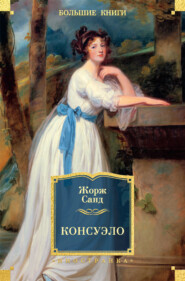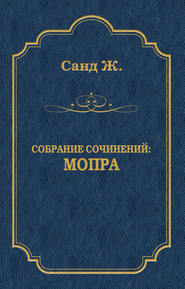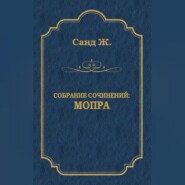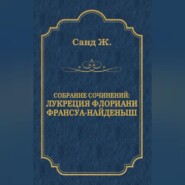По всем вопросам обращайтесь на: info@litportal.ru
(©) 2003-2025.
✖
The George Sand-Gustave Flaubert Letters
Настройки чтения
Размер шрифта
Высота строк
Поля
Your old solitary,
G. Sand
What an admirable definition I rediscover with surprise in the fatalist Pascal!
"Nature acts progressively, itus et reditus. It goes on and returns, then it goes still further, then half as far, then further than ever." [Footnote: George Sand had copied this and fastened it over her work table at Nohant.]
What a way of speaking, eh? How the language turns, is twisted, made supple, is condensed under this grandiose "hand."
CVII. TO GEORGE SAND
Tuesday night
What do I say about it, dear master? Should one excite or repress the sensitiveness of children? It seems to me that one should not have any set rule about it. It is according as they have a tendency to too much or too little. Moreover, the basis isn't changed. There are tender natures and hard natures, irremediably so. And then the same sight, the same lesson can produce opposite effects. Could anything have hardened me more than having been brought up in a hospital and having played, as a child, in a dissecting amphitheatre? But no one is more sensitive than I am to physical suffering. It is true that I am the son of an extremely humane man, sensitive in the true meaning of the word. The sight of a suffering dog made tears come to his eyes. He did his surgical operations none the less well, and he invented some dreadful ones.
"Show little ones only the sweet and the good of life until the time when reason can help them to accept or to fight the bad." Such is not my opinion. For then something terrible, an infinite disenchantment is bound to be produced in their hearts. And then, how could reason form itself, if it does not apply itself (or if one does not apply it daily) to distinguish good from evil? Life ought to be a continual education; one must learn everything – from talking to dying.
You tell me very true things about the unconsciousness of children. He who could read clearly in these little brains would grasp in them the roots of the human race, the origin of the gods, the sap which produces actions later on, etc. A negro who talks to his idol, and a child who talks to her doll seem to me close together.
The child and the savage (the primitive) do not distinguish the real from the fantastic. I remember very clearly that at five or six years of age I wanted to "send my heart" to a little girl with whom I was in love (I mean my material heart). I could see it in the middle of straw, in a basket, an oyster basket.
But no one has been so far as you in these analyses. There are some infinitely profound pages about it in the Histoire de ma vie. What I say is true, since minds quite opposite to yours have been amazed at them. For instance, the Goncourts.
The good Tourgueneff ought to be in Paris at the end of March. What would be fine, would be for us all three to dine together.
I am thinking again of Sainte-Beuve. Without doubt one can get along without thirty thousand francs a year. But there is something easier yet: that is, when one has them, not to launch into abuse, every week, in the papers. Why doesn't he write books, since he is rich and has talent?
I am just now reading Don Quichotte again. What a tremendous old book! Is there any more beautiful?
CVIII. TO GUSTAVE FLAUBERT
Nohant, 7 March, 1869
Still alone with my grandchildren; my nephews and friends come to spend two out of every three days with me, but I miss Maurice and Lina. Poor Calamatta is at the last gasp.
Give me the address of the Goncourts, you have never given it to me.
Shall I never know it? My letter is still waiting there for them.
I love you and embrace you. I love you much, much, and I embrace you very warmly.
G. Sand
CIX. TO GUSTAVE FLAUBERT
Nohant, 12 March, 1869
Poor Calamatta died the 9th, my children are coming back. My Lina must be distressed. I have news from them only by telegraph. From Milan here in an hour and a half. But there are no details, and I am anxious. I embrace you tenderly,
G. Sand
Thank you for the address.
CX. TO GUSTAVE FLAUBERT, at Croissset
Nohant, 2 April, 1869
Dear friend of my heart, here we are once more calm again. My children returned to me very exhausted. Aurore has been a little ill. Lina's mother has come to get into touch with her about their affairs. She is a loyal and excellent woman, very artistic, and very amiable. I too have had a bad cold, but everything is getting better now, and our charming little girls console their little mother. If it were less bad weather, and I had a less bad cold, I would go at once to Paris, for I want to see you there. How long do you stay there? Tell me quickly.
I shall be very glad to renew my acquaintance with Tourgueneff, whom I knew a little without having read him, and whom I have since read with a whole-hearted admiration. You seem to me to love him a great deal; then I love him too, and I wish when your novel is finished, that you would bring him to our house. Maurice also knows him and appreciates him greatly, he who likes whatever does not resemble anything else.
I am working at my novel about TRAVELING ACTORS [Footnote: Pierre qui roule.] like a convict. I am trying to have it amusing and to explain art; it is a new form for me and amuses me. Perhaps it will not have any success. The taste of the day is for marquises and courtesans; but what difference does that make? – You must find me a title, which is a resume of that idea: THE MODERN ROMAN COMIQUE.
My children send you affectionate greetings; your old troubadour embraces his old troubadour.
G. Sand
Answer quickly how long you expect to stay in Paris. You say that you are paying bills and that you are vexed. If you have need of quibus, I have at the moment a few sous I can lend you. You know that you offered once to lend me some. If I had been in a hole I would have accepted. Give all my regards to Maxime Du Camp and thank him for not forgetting me.
CXI. TO GUSTAVE FLAUBERT
Nohant, 17 April, 1869
I am well, I am finishing (today, I hope) my modern Roman comique which will be called I don't know what. I am a little tired, for I have done a lot of other things. But I am going to Paris in eight or ten days to rest, to embrace you, to talk of you, of your work, to forget mine, God be thanked! and to love you as always very much and very tenderly.
G. Sand
Regards from Maurice and his wife.
CXII. TO GUSTAVE FLAUBERT
Monday, 26 April, 1869
I arrived last night, I am running around like a rat, but every day at 6 o'clock one is sure of finding me at Magny's, and the first day that you are free, come to dine with your old troubadour who loves you and embraces you.
Send word ahead to me, however, so that by an exceptional chance, I do not have the ill luck to miss you.
Monday.
CXIII. TO GUSTAVE FLAUBERT
Thursday evening, 29 April, 1869
I am back from Palaiseau and I find your letter. Saturday I am not sure of being free; I have to read my play with Chilly on account of some objections of detail, and I had told you so. But I see him tomorrow evening, and I shall try to get him to give me another day. I shall write you then, tomorrow evening, Friday, and if he frees me, I shall go to your house about three o'clock on Saturday so that we can read before and after dinner; I dine on a little fish, a chicken wing, an ice and a cup of coffee, never anything else, by which means my stomach keeps well. If I am kept by Chilly, we shall postpone till next week after Friday.
I sold Palaiseau today to a master shoemaker who has a LEATHER plaster on his right eye, and who calls the sumachs of the garden, the schumakre.
Then Saturday morning you shall have word from your old comrade.

















